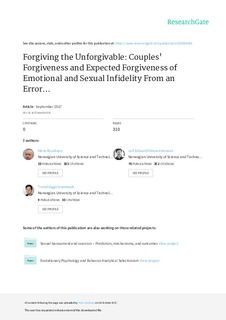| dc.contributor.author | Bendixen, Mons | |
| dc.contributor.author | Kennair, Leif Edward Ottesen | |
| dc.contributor.author | Grøntvedt, Trond Viggo | |
| dc.date.accessioned | 2017-12-07T07:34:48Z | |
| dc.date.available | 2017-12-07T07:34:48Z | |
| dc.date.created | 2017-11-09T07:20:30Z | |
| dc.date.issued | 2017 | |
| dc.identifier.issn | 2330-2925 | |
| dc.identifier.uri | http://hdl.handle.net/11250/2469459 | |
| dc.description.abstract | From an Error Management Theory (EMT) perspective, we expect a negative forgiveness bias, in which one underestimates a romantic partner’s forgiveness following one’s own transgressions. The function would be to secure that the transgressions are fully mended through reparative behavior. The extent to which this bias is related to infidelity and type of infidelity has not yet been examined. Both parties in heterosexual couples (N 92) responded independently to questionnaires about their reactions to hypothetical emotional and sexual infidelity scenarios: forgiveness of unfaithful partner’s hypothetical infidelity and likelihood of believing in cheated partner’s forgiveness. Question order was balanced for self and partner transgressions. The results suggest strong negative forgiveness bias effects. Participants reported less belief in their infidelity being forgiven compared with 2 different criteria of partner forgiveness (self-rated and expressed by partner). This negative forgiveness bias was present for both emotional and sexual infidelity scenarios, and for male and female participants. However, this bias was clearly less pronounced for emotionally unfaithful men. In addition, as predicted, relative to women, men imagining being victims of emotional infidelity perceived this to be less threatening to the relationship compared with being victim of sexual infidelity: They also expressed more forgiveness and less need of keeping distance. Need for revenge and likelihood of breaking up because of partner’s infidelity evinced no sex differentiated patterns. The study provides novel and deeper insights into how men and women perceive and react to the distress of emotional and sexual infidelity. | nb_NO |
| dc.language.iso | eng | nb_NO |
| dc.publisher | American Psychological Association | nb_NO |
| dc.title | Forgiving the Unforgivable: Couples’ Forgiveness and Expected Forgiveness of Emotional and Sexual Infidelity From an Error Management Theory Perspective | nb_NO |
| dc.type | Journal article | nb_NO |
| dc.description.version | submittedVersion | nb_NO |
| dc.source.journal | Evolutionary Behavioral Sciences | nb_NO |
| dc.identifier.doi | 10.1037/ebs0000110 | |
| dc.identifier.cristin | 1512448 | |
| dc.description.localcode | © American Psychological Association, [2017]. This paper is not the copy of record and may not exactly replicate the authoritative document published in the APA journal. Please do not copy or cite without author's permission. The final article is available, upon publication, at: [http://doi.org/10.1037/ebs0000110] | nb_NO |
| cristin.unitcode | 194,67,40,0 | |
| cristin.unitname | Institutt for psykologi | |
| cristin.ispublished | true | |
| cristin.fulltext | original | |
| cristin.fulltext | preprint | |
| cristin.qualitycode | 1 | |
